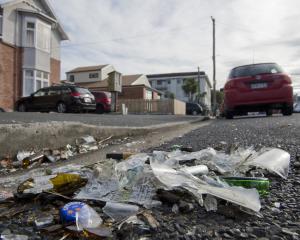
Over the next fortnight, North Dunedin will come alive with partying University of Otago students celebrating Flo Week and O Week, the two weeks before classes begin.
Flo Week sees the return of many students moving into their new flats, with the name deriving from "flat orientation week".
Senior Sergeant Anthony Bond, of Dunedin, said police were gearing up for a busy two days with an increased police presence around the university.
It was the first real O Week for three years, as Covid-19 restrictions had kept people in lockdown or put limits on how many could be at a venue together.
There were many initiatives to help minimise harm across the fortnight, he said.
The "CANpaign" encouraged students to avoid buying alcohol in glass bottles, which reduced the amount of broken glass in streets.
It was run alongside the Otago University Students Association (Ousa), the University, the Dunedin City Council and off license premises.
It was "very easy" to encourage as lot of students drank RTDs, which almost always came in a can, he said.
Liquor stores arranged their stores with canned beverages at the forefront and bottles at the back.
Flats could register upcoming parties with the Good One party register, which gave police a heads up about the event in case anything went wrong.
Police visited hosts prior to the event to educate and build a relationship in case any problems did occur.
The Safer Nights programme focused on engaging with students to push health promotion and educated decision-making around alcohol and other drugs.
Police would be at Tent City, an event which hosted pop-up stalls during O Week.
There was also Red Light, which focused on building awareness around uncomfortable situations that occurred in licensed premises, such as sexual assault, harassment and disorder.
At certain venues anyone who felt uncomfortable could order a "red light" at the bar.
This let staff know they needed help so they could respond and ensure the safety of the patron, whether it be a need to get home or a call to police.
A list of licensed premises involved could be found on Red Light social media pages, Snr Sgt Bond said.
Almost 100 premises throughout the Southern District were signed up.
It was a busy time for officers, with lots of time spent on their feet and countless selfie requests, but in general police looked forward to it, he said.














